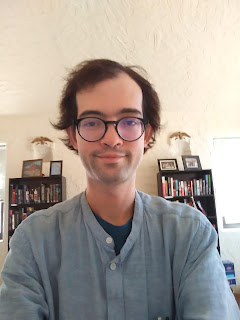This is a guest post by author Hugh Fritz, part of the blog tour with WOW! Women on Writing. Check out the launch day post to find out more about his book “Anamoly Aftermath.”
This is a fitting time to write about pursuing a second degree because the process is almost complete. In fact, I’m scheduled to defend my thesis in less than 2 weeks. I took a break between degrees. After graduating, I worked for about five years and then decided to return. The reason was the same as most people likely decide to return to school. I wasn’t satisfied with my career but also felt locked in it. I was cautious this time and didn’t register for classes until I was sure it could be done without accumulating any more substantial loans. I’m proud of myself for being able to return to school while keeping the financial burden manageable (not low, of course). Unfortunately, my pride doesn’t go much further than that.
I registered for a master’s degree in chemistry. I didn’t expect it to be easy and wasn’t let down. Passing the coursework requirements would have been a daunting challenge if classes were held in person. It went a bit further because I started when all classes were being held online which was a first for me. It was hard to ask questions without being able to point to parts of a board or sections of my notes. I also think the professors made the exams harder. All students were required to have the cameras on their computers active during tests, but the instructors probably assumed we’d cheat and put books or notes in the camera’s blind spots. I admit that I was tempted, but it’s moot because the questions were written in ways that couldn’t be answered by simply referring to the covered material. Today I applaud them for the extra effort, but at the time it was frustrating. I was put on academic probation for the first time in my life and while I managed to get out of it, that was when I started to question my decision to go back to school.
The structure of the master’s program is that students complete coursework requirements first, and then focus on independent research. I hoped that independent research would be a better fit for me than studying textbooks and preparing for exams. In a way it was, in the sense it helped me understand my strengths and weaknesses. I enjoy learning how to use different analytical equipment and new ways of preparing samples. I’ve had a job the entire time I’ve been in school, but I went into the lab as often as my schedule would allow and collected as much data as possible. In fact, I’m in the lab right now. There’s a biological aspect to my project and I’m writing this while waiting for an autoclave to finish its cycle. I find being in a lab much more rewarding than sitting at a desk in an office, which was what I was after when I started this journey. But as much as I enjoy the practice of chemistry, I still question my place in the program because I have a massive downfall, which is open discussions.
Chemistry is an amazing subject and there have been major advances in the field in just my short lifetime. But it comes with high demands among peers which can be harsh considering the sensitivity of experiments. Articles in scientific magazines present findings so eloquently and it’s easy to think that every experiment went smoothly. I set that same tone in my thesis, but it wasn’t that way at all. There were times when I was confident in my findings, but every experiment is followed by an investigation, which can feel more like an interrogation. The researcher is expected to go through every step of their procedure and if anyone in the audience notices a misused term, or a miscalculation, or just feels like something was done improperly, they latch onto it and won’t let it go until the experimenter can explain themselves or just say they’re sorry and didn’t know what they were thinking (in my case, the latter has been more common). I’ve seen this before at conferences and other students’ defenses but couldn’t fully appreciate the pressure until I was the one in the spotlight. Lately, people have asked what my plan is after I’m finished with the program. I tell them that I had a plan but I’m not sure about it anymore.
Some people get an advanced degree and have the confidence to seek a promotion or attempt a complete job change. I’m still on track to complete this program. Not everything I did in the lab was a blunder; I have enough solid data to form a conclusion. Also, spending years being called out on every mistake has forced me to reflect on my errors. I’ve redone a lot of tests and even if I’m caught in another flaw during my defense, I think I can explain myself in a satisfactory manner. The thing is, even if I successfully defend and complete the degree requirements, I’ll leave this school with shattered confidence. Every mistake is still fresh in my mind, partially because a few early ones still get brought up from time to time. I’m not sure what the future holds, but soon I believe I’ll be able to say that I technically completed everything that was expected. I’m no genius, but hopefully, that qualifies me for something that I’ll enjoy more than what I’m doing now.
Anomaly Aftermath is available in print and as an ebook at Amazon. You can add it to your GoodReads reading list as well.
About Hugh Fritz

Hugh Fritz is thrilled to have completed his Mystic Rampage trilogy, a project eight years in the making. While writing the series he has outlined and written rough drafts of other stories ranging from horror to romance. He is currently bouncing between his works in progress, deciding which one should get his full attention. Whatever comes next will assuredly be a step in a whole new direction.
Find Hugh Online:
Author website: http://www.hughfritz.com/
Blog site: http://www.hughfritz.com/blog
Facebook: https://www.facebook.com/people/Stories-by-Hugh-Fritz/100063563318857/
Amazon: https://www.amazon.com/stores/Hugh-Fritz/author/B072BRDLDD
